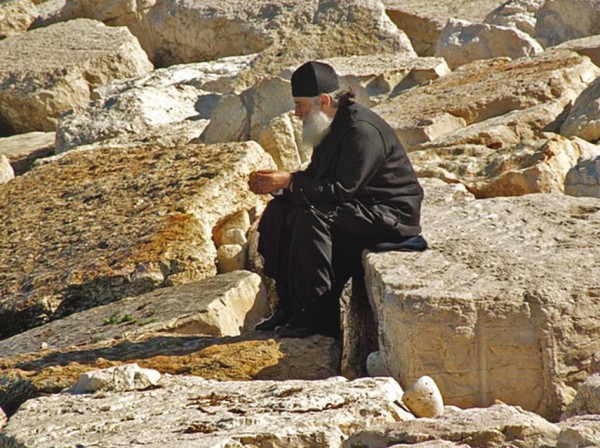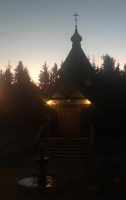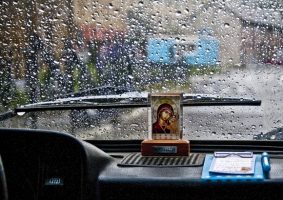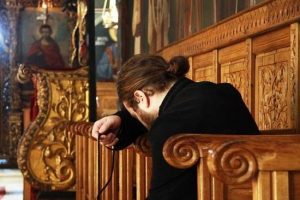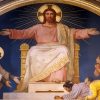I was asked specifically to speak on what we call “the Jesus Prayer”. The Jesus Prayer is called by that name because its absolute centre is the name of Jesus. It reads, “Lord, Jesus Christ, Son of God, have mercy on me, a sinner.” It is a short prayer, which to us is simultaneously a very complete profession of faith and also a cry in our need for mercy, help and fulfilment. And I will insist in turns on its various elements.
The centre of it, as I have already said, is the name of Jesus. But we proclaim Jesus our Lord and we proclaim Him also the Son of God. This makes this prayer, which is Christocentric, centred on Christ, Who is the door according to His own word, Who is the truth and the way and life, it makes this prayer to be not only centred on Christ but open up on the mystery of the Holy Trinity because we know from St. Paul that no-one can call Jesus his Lord unless he be taught by the Holy Spirit. It is the Spirit of God who teaches us in ineffable groanings to cry Godwards, but it is also the Spirit of God who teaches us with a clarity, which can be possessed only in and through Christ, to call the God of Heaven, the Holy One of Israel, our Creator — Father. And so when we pray the Jesus Prayer and use the name of Jesus and proclaim Him Lord, His name and His lordship open up on the mystery of the Trinity – the Spirit teaching us and leading us in Christ to the Father.
But to recognise the lordship of Christ is not simply to recognise an objective fact. Indeed, the world is the realm of God, indeed, God is the Lord of all but not within the relationship, which the Holy Scriptures teach us about. St. John Chrysostom teaches us that anyone can rule but only a king can give his life for his people. Such is the King and the Lord Who is ours. And so when we call Jesus “Lord”, it is in a relationship where He has taken the first step, He has offered Himself as a sacrifice for our salvation, and it is as such that we enthrone Him in our lives, He becomes the King, the Lord of our mind and of our heart, of our wills and of our doing. Unless we enthrone the Lord in all our life, the prayer of which I am speaking has no meaning, it is only a collection of hypocritical words. So that the word “Lord” in the Jesus prayer is both an assertion of what He is, a recognition of what He is for us and in our life and also an unceasing challenge for us because throughout our lives we will have to conquer our minds and hearts, our wills and actions to the perfect dominion of Him whom we recognise as our King and our God.
And then the name of Jesus, Jesus Who, as I have already said, is the door that opens up on things eternal and leads us to the Father. Jesus Who is the human name of God, Who is the proclamation, the absolute assertion of the Incarnation. To say that God has a human name means that God became man, true God and true man as we proclaim Him in the Creed. And this again is a challenge, a challenge to our rational minds, to our secularised thinking, it confronts us with a mystery, and a mystery is not something mysterious, the word “mystery” from the Greek means something that keeps us silent, that makes us spellbound. It is only in this contemplative silence of awe and adoration that we can accept, recognise and then experience with certainty the Incarnation, the fact that God has become man and that we can call the God of Heaven by an earthly and human name. We call Him Christ who is the fulfilment of the Old Testament, the Messiah, the Anointed One and we call Him also because we know this in the communion, which prayer and sacrament, which adoration and a life according to the Gospel teaches us, we know Him to be truly the Son of God.
If you look back for origins into the New Testament, you will find that the Jesus prayer as I have pronounced it and as I have tried to describe it shortly, is rooted in the story of Bartimaeus, the blind man whose story can be read at the end of the X chapter of St. Mark’s Gospel, — the man blind who sat by the wayside, who heard a crowd pass, a crowd that sounded different from any other crowd and who asked, “Who is passing me by?” And when he was told that it was Jesus, he began to cry, to shout, “Jesus, Son of David, have mercy on me.” We know more than Bartimaeus, but it is the same cry, which we raise to our Lord.
And we are in more than one way in the same situation as he was. We are blind. The visible seems to make for us the invisible dim, if visible at all, we are blinded by what we see, we are deafened by what we hear, we perceive the world only by its exterior. The world is no longer transparent to our vision and to our perception; and so like Bartimaeus we may well cry to the Lord, “Lord, restore my sight!” There will be voices that will tell us, “What is the point of crying? Leave the Master alone, He has greater things to do than to look after you. Who are you?” Who am I? If we truly are aware of our blindness that separates us from all that God has made, we will cry, we will cry out of our need, and this is very important because, that applies also to every single prayer, which we pronounce, it is out of an awareness of need that we must pray. One does not pray because a service is going on or because time has come to recite prayers, a prayer, which is not brought into our heart and then gushes out of our heart as a sincere cry expressing a real need is just words and cannot reach the Lord.
So before we cry, before we pray, we must set ourselves face to face with our actual situation, and this situation is described in the Jesus prayer in the words “a sinner”. “Lord, Jesus Christ, Son of God, have mercy on me, a sinner.”
Now, more often than not and far too often we think of sin only in moral terms, in terms of infringing the law, the law of man or the law of God, in terms of morality. But sin is something much more essential, basic and general. To be a sinner is to be in a state of separation from God, from one’s own depth, one’s own true self and from our neighbour. And this is a condition, which we can recognise in each of us all the time singly and collectively. Adam died because he lost God, our mortality is a continuous reminder to us that we have lost God, that we are not in perfect communion with Him who is life. All that in us speaks of death, of decay, tells us that we are not, as it were, plugged into life eternal. And when we are called by St. Paul for instance, to be grafted on Christ, it is this that he means, that we should be like a withering twig, which will die because its life is too precarious, but which is cut off its roots and then grafted wound to wound into the life-giving tree so that the life, which will be its, will be nothing else than the life of that tree, the tree of life.
Now, we live most of the time on the surface of our own personality. It is easier, it is less frightening. When we begin to look inward at times, we see in us opening up ever wider, ever deeper such depths that frighten us and we return, recoil back to the surface, the result being that we never, never reach that depth, that vastness, I would say, that immensity, which can be filled by the divine presence. So this is the first thing, which is our sin, — we are separated from our own depth, we accept indeed very often, most of the time, we choose to be superficial because it is easy, while to be deep seems to be frightening and dangerous. And as a result we remain separated from God because it is not on the surface that we can commune with God, it is not in the flow of words, it is not in the observances, it is not in doing things that we commune with God, it is in the depth of silence, when we accept to go deep into our own selves and to meet God who is at the core of our being.
St. Jean-Marie Vianney, a saint of the French Roman Catholic Church who was the parish priest of a little hamlet near Lyon had in his parish an old man who sat for hours and hours in the parish church silent. And one day the curé said to him, “What are you doing, granddad, sitting there for hours, your lips never moving, your fingers never running on the rosary?” And the answer was, “I look at Him, He looks at me, and we are so happy together.” This is the situation in which we should be – having dropped deep into ourselves and being at peace, serene in the divine presence. And in a way it could apply to us day and night, whether we wake or whether we sleep. You remember the psalm that says, “I sleep but my heart waketh, my heart is alive whether I sleep or not.”
And again, and I apologise for my driver for repeating something, which I have told her on the way, I met once in a French Benedictine monastery of St. Benoit-sur-Loire an old monk, so old that he could not keep awake during the services. And a younger monk eager, alive to what he thought was praying, said to him, “Father, if you can’t even keep awake during these offices, why do you come to church? Can’t you just stay in your cell and sleep?” And the old man looked at him and said, “O the nasty little boy (the little boy might have been 40 and 50), the nasty little boy, who wants to prevent an old dog from sleeping at the feet of his Master.”
That is also a condition of such trust, such simplicity that whether we are awake or not, we are in the divine presence, we can surrender to Him, give ourselves to Him and be with Him aware of it or not but in the deep silence of our soul. And unless we are at one with our own selves, unless our mind and heart, and will, and actions are brought into harmony by our harmony with God, Who the only key of harmony that can make perfect music of our selves, we will never be able to be in harmony with our neighbour, we will never be able to overcome greed, fear, hatred, which are all born of our self-centredness. So this is what we mean by “have mercy on me, a sinner”, one who is divided within himself, one in whom thought and feeling, will and action are at variance and at war, one who can not reach out to God because of the turmoil inside, one who therefore is separated from his neighbour.
And then there are the words, and this is the last things I have got to say or almost, the words “have mercy”. In present English as well as in all modern languages of which I am aware, “have mercy” has become a narrow concept, mercy is small. But if you turn to the Greek, and after all, the New Testament has reached us in the Greek language, the word is “έλέησον”. You know the word because in all Western Churches one uses this phrase “Kirie eleison, Christe eleison”. “Έλέησον” means “have mercy”, yes, but it is a word of the same root as that which signifies oil, olive tree. I am not going to expound on words but on images. If you think of the olive tree and oil, you may first remember that for the first time a twig of olive tree appears at the end of the Flood, when Noah sends out a dove to find whether the Flood has come to an end and whether there is open space, earth emerging from the Flood. And the dove, and perhaps, isn’t it in vain that it is a dove if we remember the descent of the Holy Spirit upon Christ on His baptism on the banks of Jordan, the dove brings a small twig of olive tree, which says to Noah that the wrath of God has come to an end, that peace and reconciliation are given free gratuitously and that ahead of mankind and indeed of all the created beings there is time and there is space.
So when we say, “Lord, have mercy” it is as though we said, “Lord, may Thy wrath come to an end, grant me gratuitously, freely, lovingly reconciliation, peace and forgiveness and give me time for repentance, repentance not meaning bewailing one’s past but turning one’s face Godwards and moving Godwards and with God.
And then there is another image: it is not enough to be offered time and space and opportunity if we are sick at heart, broken in body, incapable of using the opportunity offered, it is in vain that it is given, we need healing. And there is a second image, that of the good Samaritan. A man fell in the hands of robbers, he lay wounded by the roadside, unable to reach his destination, and the good Samaritan came, poured wine to burn and disinfect and oil to sooth so that he could be healed and walk towards his aim. We need healing, and when we say, “Lord, have mercy,” this is also what we mean.
And lastly you probably remember the imagery of the anointment of kings and priests in the Old Testament. Both kings and priests were called to fulfil a function that is beyond human capability, the reconciliation, the harmonising of things earthly with things heavenly on the part of the king who stands on a threshold between the one and perfect will of God and the many discordant, opposing, vociferous wills of man and that of the priest, who stands where only the Incarnate Son of God can stand by right — on the threshold between God and man speaking for God to his people. And to achieve this both king and priest needed the outpouring of grace divine. But we also have a vocation, which is beyond human capabilities, which is beyond what we can do or achieve ourselves by our own strength, we are called to become living members of the body of Christ, to be so at one with Christ that we should be on earth an extension of His Incarnate presence, that people meeting us should have met Christ. We are called to be temples of the Holy Spirit, not only a dwelling place, which would be so much, but pervaded, filled with the Holy Spirit in the way in which a bar of iron can become glowing with fire if it is put into a furnace so that both fire and iron are at one. We are called in the words of St. Peter’s Epistle to become partakers of the divine nature, we are called to become the sons and daughters of God, and St. Irenaeus of Lyon says, so that one day when all things are fulfilled in the Only-Begotten Son of God and by the power of the Spirit the whole of mankind should have become the only-begotten son of God. This is our vocation. But it is beyond our doing, it can be done only if God pours his grace upon us. You may say, “But this is not possible. Where shall I find the strength to achieve it?” Remember the words of St. Paul. He prayed for strength and the Lord answered, “My grace suffices unto thee, My power is made manifest, deploys itself in weakness,” not in laziness, not in slackness or sloth, not in timidity or cowardice, no, but in that frailty, which surrenders to God, in a frailty, which is surrender, which is transparency, which is the situation of a sail on a boat, the frailest part of the boat, but which turned in the right way can engulf the wind and bring the whole heavy structure …












